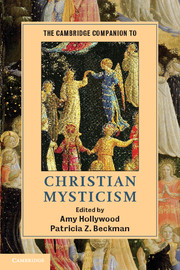Book contents
- Frontmatter
- Contents
- Contributors
- Introduction
- Part I Contexts
- Part II Key Terms
- Part III Contemporary Questions
- 13 Latin and the Vernaculars
- 14 Transmission
- 15 Writing
- 16 The Body and Its Senses
- 17 Mysticism and Visuality
- 18 Emotion
- 19 Authority
- 20 Gender
- 21 Sexuality
- 22 Time and Memory
- Select Bibliography of Christian Mystical Texts up to around 1750
- Select Bibliography of Modern Works Related to the Study of Western Christian Mysticism
- Author and Artist Index
- General Index
- References
22 - Time and Memory
from Part III - Contemporary Questions
Published online by Cambridge University Press: 05 December 2012
- Frontmatter
- Contents
- Contributors
- Introduction
- Part I Contexts
- Part II Key Terms
- Part III Contemporary Questions
- 13 Latin and the Vernaculars
- 14 Transmission
- 15 Writing
- 16 The Body and Its Senses
- 17 Mysticism and Visuality
- 18 Emotion
- 19 Authority
- 20 Gender
- 21 Sexuality
- 22 Time and Memory
- Select Bibliography of Christian Mystical Texts up to around 1750
- Select Bibliography of Modern Works Related to the Study of Western Christian Mysticism
- Author and Artist Index
- General Index
- References
Summary
Forgetting the created
Memory of the creator
Awareness of the inner
And always loving the beloved
Saint John of the Cross, The Sum of Perfection
At the beginning, as in the ancient shaman or Hindu forms of mystics, there is a rhythm. Where does it come from? No one knows…. The sounds, resembling fragments of refrain, form an uncanny memory, prior to meaning. One would be hard put to say what it is the memory of: it recalls something that is not a past; it awakens what the body does not know about itself.
Michel de Certeau, The Mystic FableMystical texts are riddled by different forms of temporal expression: by dates that mark the contiguity of liturgical hours and visions, by memories of divine visitations, by a desire to inhabit a memory of the imitation of Christ, by promises of divine love and hope for a future moment of perfection in God. Generally speaking, two different times are expressed, one chronological or historical and the second atemporal or eternal, a time outside of time, the time of God, which is not subject to change or to mediation and remains identical with itself. This Augustinian model, inherited by many Christian mystics, posits a human existence necessarily mediated by time, one that aspires to the promise of eternal salvation or union by means of memory.
- Type
- Chapter
- Information
- The Cambridge Companion to Christian Mysticism , pp. 341 - 350Publisher: Cambridge University PressPrint publication year: 2012
References
- 1
- Cited by



